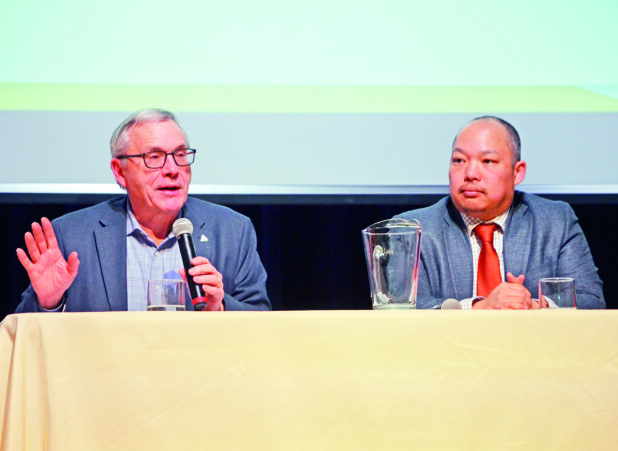General News » News
Environment, economy in focus at Climate Action debate
February 20, 2025 · 0 Comments

Ontario needs to collaborate more with all levels of government, according to Ontario Liberal and NDP candidates who took part in an all-candidates meeting last week hosted by Climate Action Newmarket-Aurora.
Held at Newmarket’s Old Town Hall last Wednesday night, February 12, the all-candidates meeting saw a healthy turnout from voters despite the winter weather advisory, but a less-healthy turnout from candidates as only Ontario Liberal candidate Chris Ballard and NDP candidate Denis Heng turned out to answer questions.
Newmarket-Aurora candidate Dawn Gallagher-Murphy cited a previous commitment for her absence, while Green Party candidate David Jakubiec, who was previously confirmed to attend, bowing out at the last minute due to an emergency.
Perhaps unsurprisingly given the host organization, many of the questions were focused on concerns related to the environment and climate, but issues were wide-ranging, from economic prosperity to transit.
Asked where protecting the environment and addressing climate change would fall on each respective candidates’ list of priorities, Heng said that, as a public health professional, “the environment is something we look through as a lens for everything.”
“We can’t talk about effectively solving affordability issues without going through an effective environmental lens,” he said. “We can’t talk about effectively solving affordability issues without going through an effective environmental lens. We can’t talk about building an economy for the future that is going to be sustainable without looking at it through an environmental lens.”
“Immediate solutions” on the environmental front, he said, would include halting work on Highway 413 and the Bradford Bypass as they “aren’t needed right now” when the NDP propose taking tolls off the 407 and making better use of existing infrastructure.
“It’s all about thinking about those sustainable options and figuring out how do we build our communities to allow for accessible transportation, getting cars off the road, not building over our Greenbelt and Holland Marsh… and one of the things we’ll do from Day 1 is remove 407 tolls and we will be funding 50 per cent of public transit to give people real choices they can use now in making the environmental choice an easy choice.”
Ballard, who said he was sitting before the public as Ontario’s last Minister of Environment and Climate Change before the Progressive Conservative Ford Government removed “climate change” from the name of the Ministerial portfolio, said environmental protections need to be “restored and strengthened,” including reinstating the planning authority in local Conservation Authorities.
“They have amazing, valuable ideas and they have been just set aside, threatening our wetlands and trapping us because homes can be built now in floodplain land,” said Ballard. “We’re going to make sure we invest in climate resilience at the municipal level. We’re so far behind all across Ontario, whether it be putting in extra culverts or retaining ponds to capture run-off from big rains, reduce waste initiatives by strengthening our recycling programs and focus on strengthening our circular economy and really implementing a Made in Ontario Climate Action Plan focused on reintroducing Green Energy and Sustainable Transportation and conservation efforts.”
Ballard said he was “not a fan of building more highways” and said going ahead with the Bradford Bypass, he added, would not only have environmental consequences but clog Highway 404 for local commuters.
Both candidates agreed that change is needed when it comes to the three levels of government and how they interact.
The group asked the candidates whether they supported the Association of Municipalities of Ontario’s call for a joint social and economic prosperity review, which would fix the “broken provincial-municipal framework.”
Heng said a more “collaborative” approach amongst government is certainly needed.
“I think part of the responsibility is… putting municipalities in a position to succeed,” he said. “One of the things an Ontario NDP government would do is we’d reverse the downloading of charges. We would start to upload some of the things, those services that were seen as important with regards to municipalities uploading services so that we can actually put municipalities in a position to succeed with regards to those services they deliver to their residents.”
A similar view was offered by Ballard, a former Aurora councillor, who cited both his experience at the municipal level, as well as the municipal experience of Ontario Liberal Leader Bonnie Crombie, a former mayor of Mississauga, as giving them a unique perspective on the needs shared by communities like Aurora and Newmarket.
“We know there’s a number of serious issues and have been serious issues for many years,” said Ballard. “What the Liberals are proposing, if we’re successful, is a new deal for municipalities that we need to figure out how do we fund municipal infrastructure and take a lot of the costs off the shoulders of taxpayers. It really is regressive. We know that growth doesn’t pay for growth. The development charges, which can account for $100,000 – $170,000 per house in this area, still doesn’t cover the cost of putting [in] that house. We need a new deal for municipalities. It might be different based on the area that the municipality is in, but we have to reduce the burden on municipal taxpayers and on municipalities. Our proposal is two-part when it comes to affordable housing – speeding that by removing DC charges and removing the transfer of taxes on some buildings to reduce the burden. Most importantly, we need to figure out a new way of funding municipalities and the Province has to step up.”
This collaboration was also touched upon when it came to healthcare and the economy.
The Federal Government, said moderators, increased the Provincial Health Transfer by “several billion dollars per year” but claimed the money was not being spent on healthcare.
Heng said an easy fix was spending that money on healthcare and ensuring the Provincial government is held to account when it comes to the money they receive from the Feds.
“I think it is absolutely appalling that the Ford Government has argued for more funds for specific things and then have kept it in their coffers—or maybe they haven’t, I don’t know,” said Heng. “This is what accountability and transparency comes from. Affordability and healthcare… it seems to me, these are always the things that are important to the electorate and taking it and once again putting it through the environmental lens to improve the lives of everyday Ontarians, everyday Newmarket-Aurorans in our community.”
Added Ballard: “It is not only healthcare he is not spending the money he’s receiving. There is all sorts of money he got from training and the green economy, etc., that he just used to balance his books. I am sure some of it went for the $200 ‘Dougie Cheques’ we’re all receiving right now. A lot of it has gone to pay for the booze in corner stores and having to pay off those big American companies so we could do that. The list is on and on and on. We don’t need a $50 billion tunnel under the 401 that is not going to be ready in my lifetime. I don’t need that tunnel in 50 years, I need a doctor tomorrow. This doctor needs doctors and nurses. One in 10 people here do not have a Family Doctor and that is awful.”
Ballard said healthcare and the economy are the two most prevalent issues he’s been hearing at the door during this campaign, but questions were also being asked by tariffs threatened by the U.S. President.
“The economists have told us for years that if we removed interprovincial trade barriers, that is a four-point gain in our GDP. That makes us all wealthier. The worst tariffs Mr. Trump has proposed so far is a 2-point hit on GDP. If we can get rid of the tariffs, we’re ahead two points. That can go towards weathering the storm of Mr. Trump. We’re all in favour of removing those trade barriers,” he said. “Anita Anand, talking Federally now, it could be done in four to six weeks, it’s that simple. We have always needed the political will. It is not something that a lot of us think about day to day, but now we’re thinking about it and now we can do it.”
Heng agreed that the will needs to be there, despite interprovincial barriers not being the “sexiest” topic in an election.
“It’s really about the hard work of getting things and working together,” he said. “When I think about what’s stopping us right now, I think about political inertia and I also think about the people or the companies that are benefiting from the status quo. I think those are the things for us to truly move forward, is what government, what party in government would be willing to take on those people… There are going to be winners and losers and some of the people who are benefiting from the status quo might not be getting as much. They might not be making as much profit as they are now. We can do it if we have the concerted effort. I would be thinking about who is the political party that is willing to put in that political effort to get this done.”
By Brock Weir












